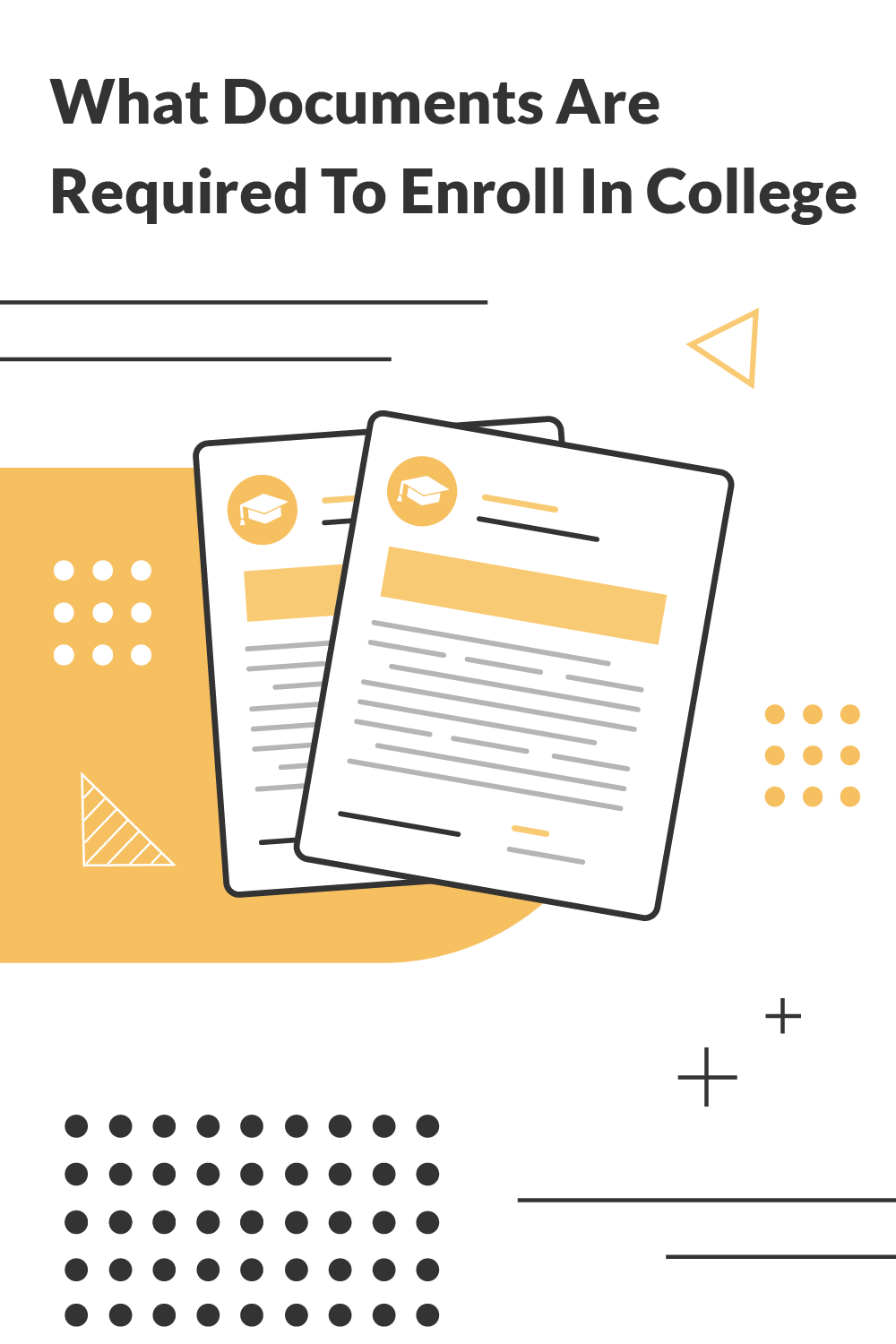
Enrolling in school is a big task that requires organization so we’ve created a list of what documents are required to enroll in college to make it as easy as possible.
I remember feeling anxious the last time I enrolled in school. I was super excited but, at the same time, so nervous I had forgotten something!
Along with filling out my application and financial aid, there was still so much I needed to submit to both the financial aid office and the office as registration. So here's what you'll likely need, as well as where to find these documents if you need replacements.
Don't forget to check out our college application checklist here.
Identification
Documentation needed for proof of identification may vary from school to school. However, most schools require these documents, especially when receiving financial aid.
Birth Certificate
Your birth certificate is one of the most requested documents required as proof of identification. You can scan your original birth certificate; if it happens to be misplaced, you can always order another one online.
If you need to request a certified copy, the first step is to find out where your state or county’s vital records department is located. This map provided by the CDC is a great starting point to check.
Social Security Card
Your social security number is used as a universal identity number when applying for a job, opening a bank account, getting a passport, filing your taxes, and filling out your financial aid application. This number can also be used to track you through various agencies and for background checks.
When enrolling, a social security card is an official document with your social security number printed for identification purposes. If you need a new copy of your you can find out how to request yours at SSA.gov.
If you're a DACA recepient student, you still need to get your SSN. Here's the process.
Driver’s License/ Identification Card
Not only does a driver’s license issued by the state you currently reside in show proof that you are allowed to drive but it’s also authenticated proof of your identification that contains a picture of you and your current address and a description of what you look like. Colleges use this to help prove you are who you say you are and that no one is committing identity theft on your behalf.
If you don’t have a driver’s license, another form of identification with your picture on it, such as a regular identification card or passport. State ID cards are issued through the state, so you'll need to find the rules for your particular state if you need to have an ID card issued.
Academics
After submitting identification, you’ll most likely be asked to submit the following academic information:
Standardized Test Scores
The Suite of Assessments (SAT) and American College Testing (ACT) are two standardized tests widely used to determine college admission among colleges and universities. Both tests were created to allow schools to see how well students understand reading, writing, and math on a national level. The ACT also offers a science section that can benefit students going to school for science or medicine.
While some schools do not require a standardized test score, it’s best to be prepared. These scores determine your class placement and can also be used for recruiting purposes, additional financial aid, and overall acceptance to the school you are applying for.
If you need a new copy of your SAT scores you can do so at CollegeBoard.com. There is a fee, but the site doesn't say how much. To get copies of your ACT scores you can set up an account at MyACT and request scores to be sent to colleges from there. There is an $18.50 fee each for tests taken after September 1st 2020. Scores from tests taken before that are $30 each.
High School Transcript
Schools will ask you to provide your high school transcript. This document highlights your classes and your grade in that subject. Higher ed institutions may require you to take additional classes, such as fine arts or a second language, and courses required for graduation, such as math and English. These schools may also require you to have a certain grade point average (GPA) during your high school career for acceptance into their program.
You can request transcripts from your high school.
Finances
Finances are another essential category when considering the documents needed to enroll.
FAFSA
If you haven’t yet, stop here and fill out your Free Application for Federal Student Aid (FAFSA ® ). Your FAFSA is a vital document needed to complete your enrollment process in school. Your FAFSA determines how much financial aid you are eligible for from the U.S. Department of Education.
Once your application is processed, you’ll be sent a Student Aid Report, which includes all the information you’ve provided to receive financial aid. It will also include what’s known as your Expected Family Contribution (EFC) based on income and assets you or your guardians may have. Financial aid can consist of Pell Grants, subsidized loans, unsubsidized loans, and information on Parent PLUS loans if needed.
Copy Of Financial Aid Award Letter
After completing your FAFSA and receiving your Student Aid Report, your information will be forwarded to the school to which you are applying. Once this is received, your school’s financial aid officer will send you a financial aid award letter. This letter lets you know what types of financial aid you qualify for when attending their school.
In addition to the types of financial aid listed above, your school can provide additional assistance in the form of grants and scholarships that exist exclusively for your program and circumstances.
If you need a copy of your Student Aid Report you can find the directions to request a copy at StudentAid.gov.
Checking Account
When enrolling in school, you may be asked to provide checking account information. Many schools will give you the remainder of your financial aid after your classes have been paid for via direct deposit or check; it's easier on both the school and you to provide your checking account so that the funds can go directly to you without any wait time. Your checking account may also be put on file so that you can purchase items from the bookstore or pay for additional costs such as room and board.
You'll be asked for your routing number and account number. If you have paper checks, you can find both numbers at the bottom of a check. If not, call the bank and a customer service rep should be able to get those for you.
Here's where you can find the best college student checking accounts.
Medical
One area of documentation needed to enroll that most need to remember is required documents for health and safety reasons.
Immunization card
Your immunization records contain important health history regarding Public Safety in the form of vaccines. Vaccinations keep not only you healthy but can keep others healthy as well. Some diseases can be highly transmissible, so receiving timely and scheduled immunizations is crucial.
Some vaccinations that are required are measles months and rubella. Other vaccinations that can be necessary are ones related to Covid-19, meningococcal meningitis, human papillomavirus (HPV), influenza, tetanus-diphtheria, and pertussis.
If you have a gap on your immunization record, you can work with both your primary provider and school for accommodations.
Unfortunately, there isn't a central location where you can get copies of your immunization records. If they were provided to your high school, you may be able to get a copy from them. Also, some states keep records at the state health department, so you can try that.
If that doesn't work, you can call the doctor's office where it was performed and see if they can get you a copy. If you can't find them, you may need to get the immunization again.
HIPPA Release Form
The Health Insurance Portability and Accountability Act of 1996 (HIPAA) is a federal law that requires organizations to protect patient health information. This Privacy Rule is used when others ask to disclose a patient's health information. While you can have your information disclosed for permitted reasons, it's usually only those you give access to, such as a doctor or other healthcare provider.
By filling out a HIPAA form, you allow your school to keep health information private and request it as needed. This can be essential if something happens to you at school that requires medical assistance.
Emergency Contact Information
In case you require medical or any other type of assistance, it's essential to make sure that you have your critical contact information to provide in case of an emergency. Many people only list their parents, but after working and education for 20 years, I highly recommend listing an additional relative or family friend that you know is easy to get a hold of this way, they can relay the message to your parents if needed. Information for your contacts can include their numbers, employer, home address, and email.
Having all of these documents collected before it’s time to enroll can ensure that you have a smooth transition as a student to your new school and are registered for the classes you need.

Athena Valentine Lent is a finance columnist for Slate and the author of Budgeting for Dummies. Her writing has appeared in BuzzzFeed, Tripadvisor, and Slate, among other places. Her personal finance blog, Money Smart Latina, won the Plutus Award for “Best Personal Finance Content for Underserved Communities” in 2020 and was nominated for “Blog of the Year” in 2022. When not working she can be found reading Stephen King with her main man, a polydactal cat named Harrison George.
Editor: Ashley Barnett Reviewed by: Robert Farrington
